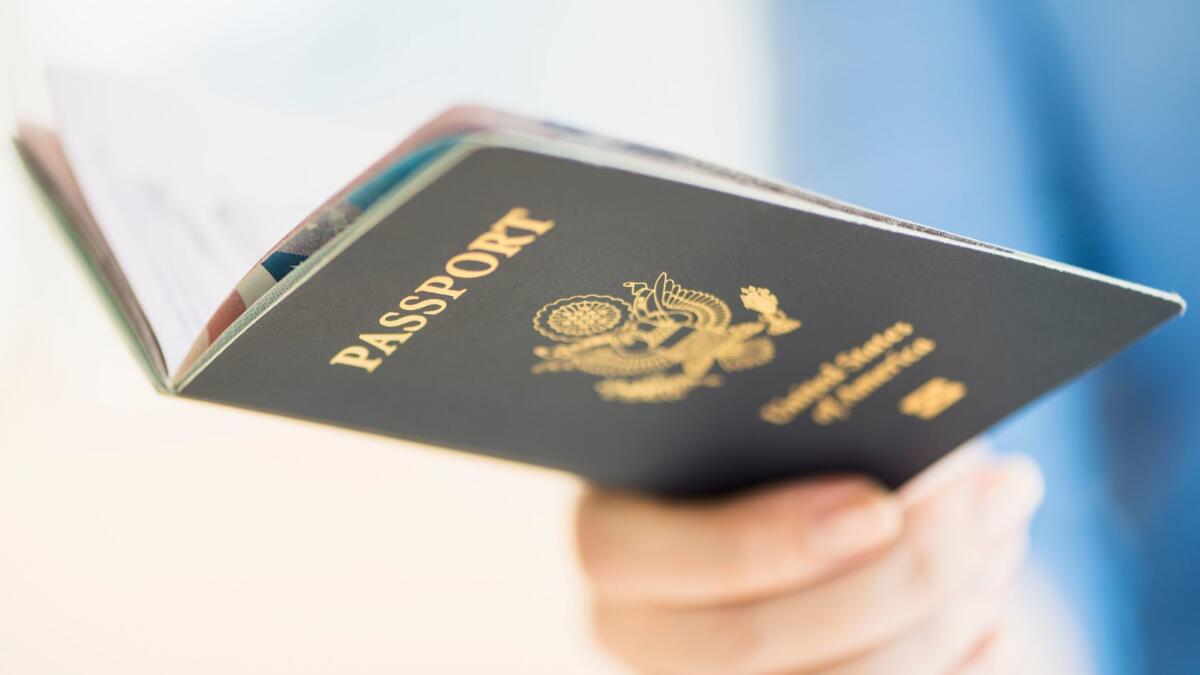Op-Ed: What message was the U.S. government trying to send when it detained me at the border?

- Share via
At the end of November, I was detained at the American-Canadian border, and I find myself struggling with feelings of resentment, anger and shame. I had traveled from Los Angeles to Edmonton, Canada, where I delivered an academic lecture at the University of Alberta. Getting off a plane and gaining entry into Alberta, I was treated with respect and dignity, and was sent on my way with a lilting, “Welcome to Canada, professor.”
Returning home to the United States was a different experience. To set the scene, I should mention that I was traveling with my wife and 11-year old son. I am in my 50s, wrestling with a number of health challenges, and I use a wheelchair.
The first indication that something was amiss came when my wife tried to complete online check-in for us all. It wouldn’t work for me. Later, as we passed through the airport security line in Edmonton, I was asked to separate my belongings from that of my family, something that I obligingly did. After going through a security detector, I was meticulously patted down, and I, as well as my belongings, were swabbed more than once, I assume for explosives residue.
We had been welcomed with dignity as we entered Canada, only to be dehumanized when we came home.
The U.S. Department of Homeland Security stations Customs and Border Protection agents in Canada, so travelers in effect cross the border before they even arrive in the U.S. At the Edmonton airport, travelers to America insert their passports into a scanning machine, fill in basic information on a touchscreen, and get their photos taken. Then the machine ejects a form that must be presented to the Homeland Security officers.
I was rather surprised and somewhat amused when the form in my case came out of the machine with a large and jarring X all over it. When I handed it over, my American passport was placed in a red folder and I was asked to follow the officer to a side area.
I have taught and practiced immigration law so I am familiar with the basics of being called aside at a border crossing. The procedure is usually employed to make sure noncitizens have their visas and other papers in order. U.S. citizens have a constitutional right to return to their country. Even if they are fugitives from justice, they will be allowed to clear customs before being apprehended by law enforcement.
Although my wife and son were free to board the plane for home, they followed me to the side area. We were the only passengers in a large, ominous looking room with rows of empty seats. A lone officer sat behind a service window, eyeing us with suspicion as we sat down. He preceded to stare at his computer as the time for boarding our plane was quickly running out. I was not asked a single question, or told a single thing about the reason for the delay.
A much braver soul than I, my wife asked the officer if we were going to make our flight, to which he dryly replied, “I don’t know.”
After around 40 minutes, we were set free with nothing more than a “you can go.” We ran to make our flight as my wife pushed my wheelchair and our son wrangled our two wheeled carry-ons. We had been welcomed with dignity as we entered Canada, only to be dehumanized when we came home.
I keep pondering the possible reasons for this Orwellian experience. My expertise is in national security law, human rights law and Islamic law. After Sept. 11, I assisted our government on a number of anti-terrorism projects. In fact, on many occasions I risked my safety and the well-being of my family to stand up to fanatics and extremists in public forums. Does the government believe there was a legitimate reason for the big conspicuous X that graced my form at the Edmonton airport?
Why was I processed as if I was a visa holder instead of a citizen? Why was I searched as if my very skin could be a public threat? Why was I left to speculate instead of simply being informed of what was going on and given the opportunity to address the government’s concerns?
It seems clear to me that despite my background and public identity — so easily accessible to the border guards — I was profiled. And now I wonder, is there no limit to the alienation and marginalization that American Muslims will be made to feel by their own country?
We already endure everyday bigotry and Islamophobia. We have grown accustomed to derisive comments and suspicious gazes. With Donald Trump’s election, American Muslims live with added uncertainty and anxiety about exclusion, registration and even possible internment.
Before Trump’s takeover, on my journey home, I was made to feel like an outsider, a foreigner seeking entry to my own nation. It was belittling, saddening, and I fear that perhaps this was precisely the point. I battle the conclusion that perhaps the very meaning of democratic citizenship is eroding in my country.
Khaled Abou El Fadl is a professor at UCLA’s School of Law and former chair of the university’s Islamic Studies Interdepartmental Program. His latest book is “Reasoning with God: Reclaiming Shari’ah in the Modern Age.”
Follow the Opinion section on Twitter @latimesopinion and Facebook
MORE FROM OPINION:
Identity politics did in Clinton, but not the way you think
Alabama judges shouldn’t be able to override juries and issue death sentences
With Harry Reid’s retirement, will the Yucca Mountain plan be revived?
A cure for the common opinion
Get thought-provoking perspectives with our weekly newsletter.
You may occasionally receive promotional content from the Los Angeles Times.






